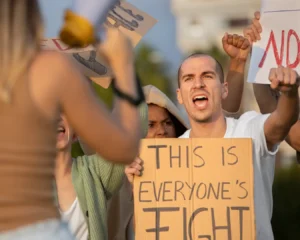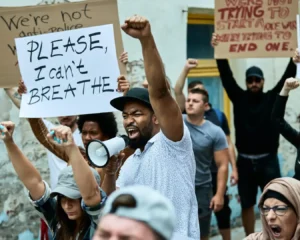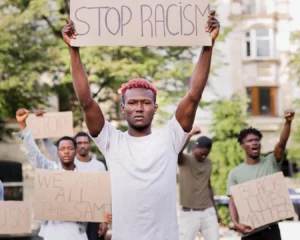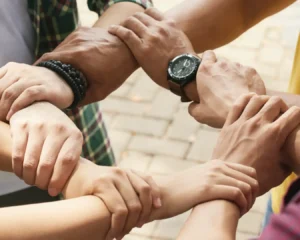Promoting Human Rights and Justice: Advocating for Equality and Fairness
Discrimination and disrespect for human rights are the enemies of social justice and equity in society.
Although discrimination and violence still exist among many, they however do not enjoy basic rights.
It is better to lead equal rights and fairness as well as challenge injustice and work together to better the position of all.
While pressing for equal opportunities and demanding that all enjoy justice.
Our goal is to have a society where no one will feel like a human and bereft of respect.
Bringing it up to a level playing field means justice that blankets everyone from the market elite to the marginalized unemployed.
We can lead by sporting inequality and justice by condemning injustice and helping out the organizations.
The main objective is to work to restore fairness and voting leaders whose focus is to champion humanities.
Joining forces, let’s try to reshape our society, revealing and sharing new principles and bravely searching for the truth.
Understanding Human Rights

Human rights are the fundamental rights and the freedom that a person has from birth until death. They are common to all human beings irrespective of race, creed, gender, nationality, and religion.
This is the reason why people who are them consider themself outside the traditional category feeling isolated even in a crowd of people.
Human rights stem from the idea that people are treated with infinite honor and regard. They are concerned with the matter of making choices for you and taking the power into your hands.
They are individuals who can participate in public life and have their opinions and positions represented.
The UN’s adoption of the Universal Declaration of Human Rights (UDHR) in 1948 is an outstanding document that has played a vital role in the fight for people’s rights worldwide.
It compiles the common human experience, recognizing for the first time every person’s human rights.
The UDHR is based upon the fact that all persons are born equal and free in dignity and rights.
It understands that they have the freedom to live.
The freedom to make their own decisions, and the freedom not to fear staying alone.
It also contains the rights of individuals such as the right to freedom of thought, conscience, and religion. The right to freedom of opinions and expression; and the right to freedom of assembly and association.
Human rights script goes beyond strictly political and civil rights. It acknowledges the existence of different economic, social, and cultural rights.
To name but a few one should include the right to work, the right to education, the right to a minimum standard of living, and the right to health.
Human rights are key, as they provide us with the platform to preserve our dignity and exercise our freedom.
They make it possible to create lives that are full of happiness, optimism, and joy in all aspects of our lives.
Therefore, to achieve our full potential. In addition to that they are enablers in bringing about a fair and equal society as well.
Technology can be a powerful enabler in the fight for human rights and justice. As highlighted in Technology for Good: How Digital Innovations are Driving Social Change. Digital innovations are driving positive social change by increasing access to information, enabling grassroots movements, and holding authorities accountable.
Leveraging technology responsibly and ethically can amplify efforts to promote equality, access to justice, and respect for fundamental rights worldwide.
The State of Human Rights Today
All mankind has been endowed with certain rights and freedoms. It is from birth and to the end of life, and as human beings, every individual everywhere in the world, we have those rights.
As they say, justice is not a human being, justice is a system, and there is nothing the system will not do.
But, human rights violations are a frequently observed phenomenon around the globe.
Discrimination, slip-ups, and inhumane treatment of one group are what go through the cycle of sadness.

Discrimination is the treatment of a person or a group of people based on their race, political persuasion, sex, gender identity, sexual orientation, or any other individual characteristic.
It can result in disparities in the enjoyment of essential rights. It could be in the form of those who are unable to pursue education, get employment, own a house, and access health care.
Power is used to limit or control freedom and suppressing the freedom of a person or a group of people is known as oppression.
Repression can be expressed in many ways for example political repression and religious persecution.
Social injustice is considered as the unequal distribution of income, power, or opportunity to different people or groups in a society.
It can blunt someoneâs rights through an extensive breach of human rights.
The list of many instances of abuse of human rights is long, unfortunately, there are many of them happening worldwide.
For instance, Uyghur Muslims, who form a minority in China, have been targeted for mass surveillance, indefinite detention, as well as forced labor.
In India, instances of caste social prejudice where the Dalits who are at the lowest level of the Hindu caste system are commonly victimized are as usual.

In the USA, Black Americans and others from the minority community tend to be incarcerated and probably get subjected to police violence much more compared to whites.
Ensuring access to information and education on human rights is paramount, especially for vulnerable groups like young adults. Initiatives like UPDEED’s AI assistant that provides reliable information on reproductive health and rights can empower individuals and communities.
Tackling misinformation and promoting rights-based education is key to advancing human rights and justice.
Legal Frameworks and International Agreements
The building block of international human rights law, namely, international treaties, comes first.
These conventions are adopted by states about cooperation and are ratified during their negotiation.
The most significant human rights instrument is the Civil and Political Rights.
The Universal Declaration of Human Rights (UDHR) was signed and adopted by the UN General Assembly in late 1948.
UDHR does not impose legal obligations, but it has exerted great influence in the development of international human rights law as a field.
It leads to many other international human rights treaties, like The International Covenant on Civil and Political Rights (ICCPR) and the International Covenant on Economic, Social and Cultural Rights (ICESCR).
Moreover, agreements that deal with international treaties are accompanied by regional human rights instruments.
These conventions involve jurisdictions of a specific area, which after their ratification, bind the states that accepted them in a constitutionally binding manner.
The regional human rights governing documents considered to be most important are the European Convention on Human Rights (ECHR) and the American Convention on Human Rights (ACHR).
The framework of these conventions put, at their disposal, a detailed agenda in which the rights and the freedom of people in their respective areas are safeguarded.
International instruments such as human rights treaties and regional human rights conventions serve as a backbone for the defense and protection of human rights globally.
They serve as guidelines on which states commit themselves to uphold their human rights obligations.
Besides, they go hand in hand with individual and group accountability, in response to human rights violations perpetrated by states.
The value of treaties such as UDHR and regional human rights conventions ought to be properly recognized.
Grassroots Initiatives and Community Engagement
The person at the low level and accepting community involvement are important in the promotion of human rights.
They promote attitudes that allow people at the community level to be involved in their development process. It identifies issues that exist in their area and ensures that people who make decisions are accountable.
Grassroots initiatives are bottom-up approaches, coming from the bottom and meeting the needs and aspirations of communities.

They are frequently headed by the ones who themselves are marginalized the most and are thus the victims of human rights infringements the most.
Many community-level proposals exist; for instance, community organizing, advocacy campaigns, and social movements are among the forms grassroots activities can take.
Community engagement is the process that inclines participation from community members in decision-making and planning procedures in their communities.
It is of crucial importance that human rights are not violated, may be respected, and some minimum conditions are met by guaranteeing fundamental rights.
In India, the Self-Employed Women’s Association (SEWA) is one of the grassroots organizations.
SEWA enables women to get credit, get trained, and also to get markets.
SEWA’s addition informing on the side of women workers at the national and international levels also has been a representation of the organizationâs success.
Another organization is UPDEED which helps women to get their rights. Join us today
To Conclude
In conclusion, promoting human rights and justice is an essential endeavor for creating a more equitable and just world.
It requires a concerted effort from individuals, communities, and governments to uphold the fundamental rights and freedoms of all people.
Throughout this discussion, we have explored various aspects of human rights and justice. It includes the importance of education, equality, and the rule of law.
We have also highlighted the challenges that exist in promoting these values, such as discrimination, poverty, and conflict.
Despite these challenges, there is reason to be hopeful. We have seen inspiring examples of people working together to advance human rights and justice.
We have also seen progress at the global level, with the adoption of international human rights treaties.
Ready to make a positive impact in the world?
UPDEED is the place for you. Our free and open platform is filled with inspiring stories from individuals and organizations who are making a difference in their communities and beyond. Connect and collaborate with like-minded individuals from around the globe on UPDEED, and discover your own potential to create meaningful change. Join our community and make a difference.Â





